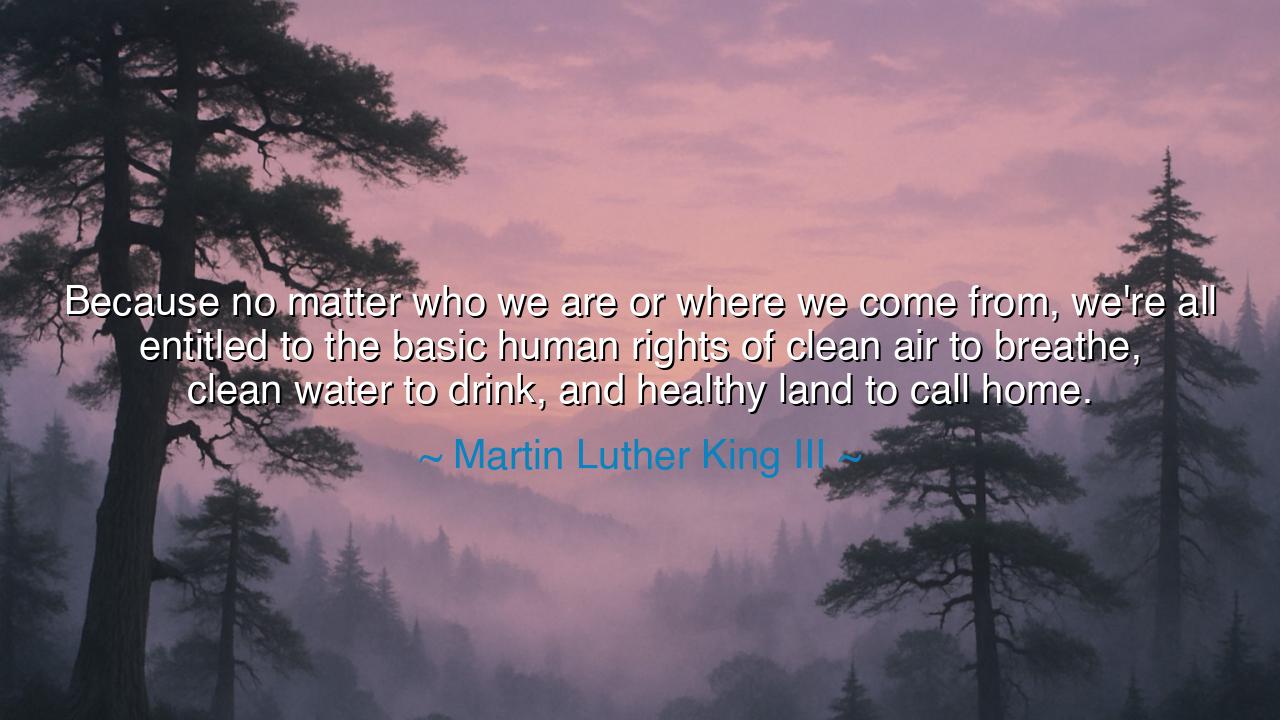
Because no matter who we are or where we come from, we're all
Because no matter who we are or where we come from, we're all entitled to the basic human rights of clean air to breathe, clean water to drink, and healthy land to call home.






“Because no matter who we are or where we come from, we're all entitled to the basic human rights of clean air to breathe, clean water to drink, and healthy land to call home.” These words, spoken by Martin Luther King III, rise like a prayer from the earth itself — a call to conscience, a song of remembrance that humanity is bound not by wealth or power, but by the sacred breath of creation. In this single sentence lives the spirit of his father’s dream, reborn for a new struggle — the battle not merely for civil rights, but for environmental justice, the right of all living beings to share in the blessings of the Earth. It is a truth so ancient that it echoes in every faith, every tribe, every tongue: that life is a covenant between humankind and the land that sustains it.
In the days of the ancients, people understood this covenant well. They built their homes beside rivers, honored the forests as temples, and saw the wind as the breath of the divine. But as the centuries passed, man grew proud. He split the mountains, poisoned the waters, and filled the air with smoke, believing himself master, not steward. Yet the Earth, though patient, remembers. When she withholds her rain or sends her storms, she reminds us that clean air, clean water, and healthy land are not luxuries — they are the very threads of existence. To destroy them is to destroy ourselves.
Let us recall the story of Flint, Michigan, a city that once thrived with the promise of industry but was later betrayed by neglect and greed. When its water was poisoned by lead, it was not the rich who suffered, but the poor, the forgotten, and the voiceless — those whose cries rarely reach the ears of power. Mothers held their children and feared the water from their own taps. It was there, amid that suffering, that the truth of Martin Luther King III’s words came alive: that injustice is not only social or racial, but environmental. When the Earth is wounded, it is the powerless who bleed first.
The origin of this quote lies not merely in a speech, but in a legacy — the continuation of a sacred dream that began when Dr. Martin Luther King Jr. declared that injustice anywhere is a threat to justice everywhere. His son, Martin Luther King III, extends that vision to the realm of nature, teaching that the fight for justice must also embrace the Earth herself. For if we demand equality among men but neglect the soil beneath our feet, our triumph is hollow. Freedom without a livable planet is a mirage in the desert — shimmering, but unreal.
The message is both moral and universal. Clean air knows no color; rivers do not recognize borders; mountains do not ask who owns them. When one part of the Earth suffers, all are diminished. The smog that chokes a city in Asia drifts to the shores of another continent. The plastic cast into the ocean finds its way into the fish upon our plates. Thus, the destiny of humankind is woven together, thread by thread, with the health of the world we inhabit. In protecting the planet, we are not performing charity — we are defending the inheritance of our children.
And yet, this struggle demands not despair but action. Just as the heroes of old rose against the tyrants of their time, so must we rise against the tyranny of indifference. Each act — the planting of a tree, the cleansing of a river, the refusal to waste or pollute — becomes a prayer of gratitude to the Earth. The ancients made sacrifices to their gods; we must make sacrifices of convenience to honor the living world. It is not the gesture that counts, but the intention: to live gently, to consume wisely, and to remember that what we take must someday be given back.
So, my child of tomorrow, remember this: the Earth is our first home, and justice begins with her. Breathe deeply of her air, drink gratefully of her waters, and walk softly upon her soil. Guard her not as a possession, but as a sacred trust. Let your choices — in how you live, how you work, and how you speak — reflect the understanding that every breath is shared, every drop of water is precious, and every field of green is a gift. For in honoring the planet, you honor all life; and in defending her, you fulfill the oldest promise of humankind: to cherish the world that gave you breath.






AAdministratorAdministrator
Welcome, honored guests. Please leave a comment, we will respond soon